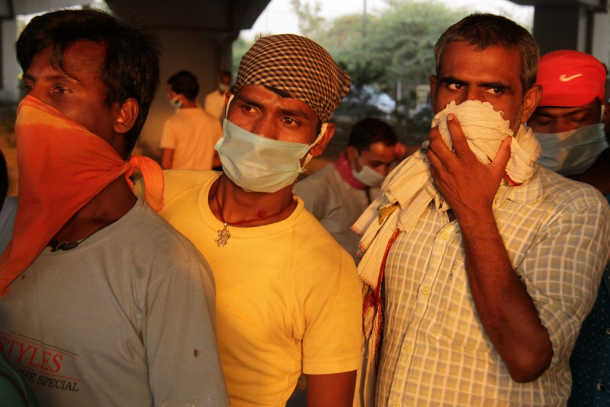
Migrant workers line up to receive food packages as they wait to cross the Delhi-Uttar Pradesh state border at Ghazipur to return to their homes on May 16. (Photo: Bijay Kumar Minj/UCA News)
Research by Caritas India, the social service wing of the Catholic Bishops’ Conference of India (CBCI), during the Covid-19 outbreak found that many migrant workers do not intend to return to the cities soon.
The findings were presented to a June 6 meeting of the organization attended by CBCI president Cardinal Oswald Gracias, presidents of regional bishops’ councils and forum directors from across India.
The meeting was conducted through a webinar as the country is still facing a partial lockdown. The research focused on the impact of the pandemic on migrant laborers and small and marginal farmers.
“There is an urgent need to document our work so that other countries, conferences and institutions learn from us. Though Catholics are a minority here, we can still help many people in need in the country,” said Cardinal Gracias.
The research was conducted in 18 states including the 10 most impacted states — Uttar Pradesh, Bihar, Jharkhand, Odisha, Madhya Pradesh, Telangana, Chhattisgarh, West Bengal, Maharashtra and Assam.
The first study focused on the basic needs, livelihoods, rights and entitlements, discrimination and exploitation of migrant workers.
It found that 28.7 percent of migrant workers do not want to return to the cities, 32.1 percent were willing to return when the situation improves, while 31.3 percent were undecided.
There is a huge loss of education recorded for migrant children, with 46.4 percent having to discontinue their studies.
Some 95.2 percent of migrants had lost their livelihoods and 10.6 percent had lost family members during the pandemic.
Regarding employment opportunities under the Mahatma Gandhi National Rural Employment Guarantee Act, only 6 percent have received jobs, whereas 37.8 percent could not get the work due to lack of job cards.
Research on the smallholder farming sector involved 424 farmers across 18 states through 45 diocesan partners. The study focused on the impact of the pandemic on agricultural production, distribution, availability of food and nutrition, income generation and expenses.
It found that 80.4 percent of farmers have reduced income. Farmers also have serious apprehensions about the upcoming harvesting season as great financial losses were incurred the previous season.
The research found that only 55.4 percent of farmers have received support from either the government or non-governmental organizations whereas 9.4 percent have not accessed any support from the state or NGOs.
Food security is greatly threatened as 49 percent of the surveyed households have limited food supplies and 16.5 percent of respondents skipped meals in the last 10 days due to lack of food.
Archbishop Sebastian Kallupura, coadjutor archbishop of Patna, suggested networking with local administrations and CBCI offices to draw up plans focusing on the target group and mapping migrant workers.
“We also need to work with the CBCI officer of environment projects to care for our common home and follow the Laudato Si' motto,” said Archbishop Kallupura, chairman of Caritas India.
The prelate also proposed organizing mass health awareness campaigns along with the CBCI health commission for migrants.
Emphasizing documenting the experiences and faith responses, Father Paul Moonjely, director of Caritas India, said “it is important to share the message that the Catholic Church is vibrantly serving the people inspired by its faith.”
Father Jolly Puthenpura, deputy director of Caritas India, informed the governing body about the support extended to the vulnerable in terms of community kitchens, food kits, hygiene kits, personal protective equipment, shelter and quarantine support as well as psychological and social support.


